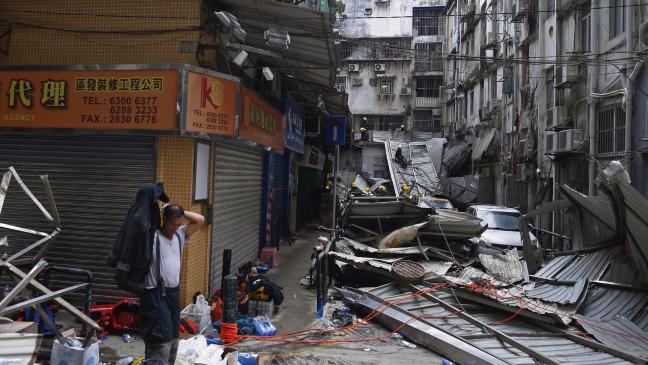Macau Bars Journalists from Reporting on Typhoon Hato Relief Effort
Posted on: September 2, 2017, 02:00h.
Last updated on: September 3, 2017, 04:07h.
Macau appears to have tightened controls on journalists entering the enclave to report on the aftermath of Typhoon Hato.

At least four Hong Kong-based journalists, including a photographer for the South China Morning Post, have been refused entry by authorities as they arrived to cover the relief effort on the grounds that they posed “a risk to the stability of internal security”
Joseph Hinks, a reporter for TIME, said he was detained by immigration officials as he attempted to leave the gambling hub after gathering information about the disaster, although he was ultimately permitted to file his copy.
Corruption Investigation
Typhoon Hato rocked Macau last Wednesday, officially causing the deaths of 10 people and leaving several hundred injured. High winds and severe flooding resulted in power outages and interruptions to telecommunications, closing down local businesses and causing severe disruption to the enclave’s casino and tourism sectors.
Macau’s anti-corruption agency is investigating the Meteorological and Geophysical Bureau (MGB) for its failure to predict the severity of the maximum category 10 storm, which was the worst to hit the enclave since 1968.
The bureau had rated Hato as a mere category 3, leaving residents unprepared for the onslaught. MGB director Fong Soi Kun resigned the day after Hato hit, apologizing to Macau’s citizens for the bureau’s shortcomings.
But anti-corruption officials want to know whether MGB delayed issuing appropriate warnings because of the financial fallout that would arise from closing the casinos, and whether the casinos industry itself was complicit in any such arrangement.
“Misleading Information”
On Thursday (August 31), the South China Morning Post reported that two elderly siblings had been arrested over on charges of “disseminating misleading information” via Chinese social media app WeChat about the death toll resulting from the storm.
The pair had alleged that five bodies had been fished out of a parking lot in Fai Chi Kei, one of the neighborhoods most affected by the storm. They claimed officials had been underreporting the death toll and preventing media access to the site.
Responding to media restrictions, Tammy Tam, editor-in-chief of South China Morning Post, said her newspaper strongly objected to “the detention of our journalists carrying out their duty to inform the public.”
She denied they posed a security “threat to anyone or anything,” adding that she would be pursuing the matter with the relevant authorities.
Ryan Law Wai-kwong, editor-in-chief Apple Daily, which was also denied entry into Macau to report on the crisis, said the ban was “absolutely ridiculous” and not only restricted press freedom but also Macau citizens’ rights to information on disaster relief effort.
“If Macau locals could not get hold of this information, they might face another disaster very soon,” he said.
No comments yet